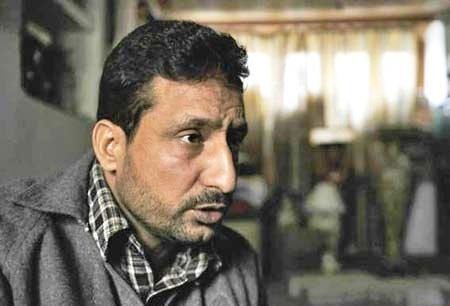Finally his brothers helped him set up a small shop outside his home in Lal Bazar.
In his mid thirties and unmarried, Shah finds it difficult to adjust to normal life. More than a decade of confinement has taken a toll on his health. His legs ache. He has to wear a prosthetic belt to walk properly. The only place he frequents is the neighborhood mosque. The habit of praying five times a day in jail has stayed with him. The outside world frightens him.
But not all such Kashmiris have gone under. Some have decided to carry on, adding purpose to their lives and deal with the trauma and indignity of wrongful incarceration. On Jan 5, 2004, Mohammad Ahsan Antoo, a human rights activist, was sitting in his room in a guesthouse in Darya Gunj when he was arrested by special cell of Delhi Police. He was in Delhi to present his human rights work to the National Human Rights Commission.
“Some men in civil clothes came to me and said that that Police Commissioner KK Paul wanted to talk to me,” recalls Antoo, who is the chairman of International Forum for Justice, a human rights organization he formed in 2000.
“When I came down from the staircase, they grabbed me and pulled me inside an auto, and then I was taken to the special cell of Delhi Police at Lodhi Colony,” he says. His belongings had reached there ahead of him.
In the morning, Antoo says, Delhi police had told the press that they caught a “big terrorist” outside the Pakistan embassy. “They charged me for coming to Delhi to kill SAR Geelani and the president. They said that they recovered hawala money from me,” he says.
Antoo has alleged that he was severely tortured in custody, and then sent to Tihar jail in 2004, charged under Official Secrets Act for a conspiracy to kill the President. Imprisoned in Tihar till May 27, 2009, Antoo was finally acquitted of all charges by a Delhi court. He was handed over to state government which released him in September, 2009.
On his return Antoo started a campaign against the ill treatment of Kashmiri prisoners in jails outside the state. He started collecting the records of Kashmiri prisoners languishing in various jails outside the state. On June 15, 2005, he quotes from his records, Delhi Police Special Branch arrested one Abdul Ahad Baba from Soura under Unlawful Activities Act, and he was sent to Tihar jail. “After 5 years, he was acquitted from the Teas Hazari court,” says Antoo. “Before him, there was another person Ghulam Nabi Khan, who was arrested and imprisoned for10 years in Delhi.”
On July 2, 2005, he quotes from his documents, 40-year old Sakib Rahman, Nazir Ahmad Sofi, Abdul Majeed Bhat, Bashir Ahmad Shah, Haji Ghulam Ahmad Dar, Abdul Qayoom Khan, and a Bihar resident were arrested from Gurgaon in a fake case and sent to court. “The court ordered Abdul Qayoom and Darender Kumar, one Hindu, to be released, and the rest of five Kashmiris were sent to Tihar jail. The police said they arrested them along with weapons,” says Antoo. All The five Kashmiris were acquitted in 2011 after five and a half years of imprisonment, and the court ordered punishment for the police and intelligence officers who implicated them. “The court ordered action against the erring officers and asked the police to report to the court within one month. The court said the fake encounter story is unacceptable in a civilized society,” says Antoo. “The judge said in his judgment that there is a tendency among some officers of Delhi Police to frame false charges against some people.”
On March 21, 2010, Antoo was slapped with PSA and sent to Kuthua jail. On May 7, 2011 he was released from Maisuma police station and again arrested on May 11 by the STF from Kupwara and finally released on bail in September. “They charged me with sabotaging the rehabilitation policy of government for released militants,” says Antoo, who has lost seven of his family members in the past twenty years of conflict.















